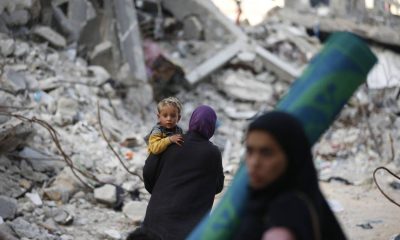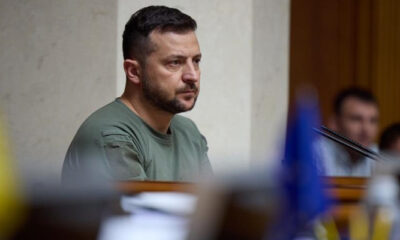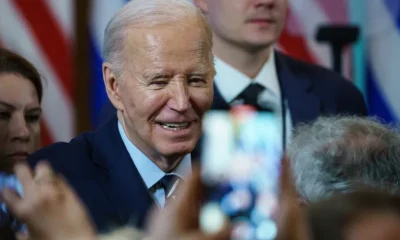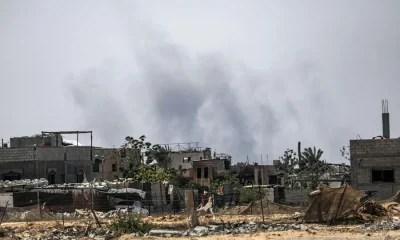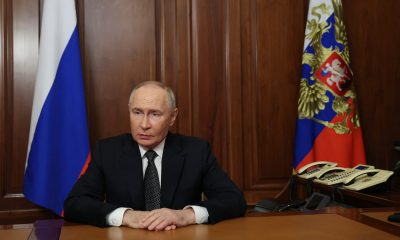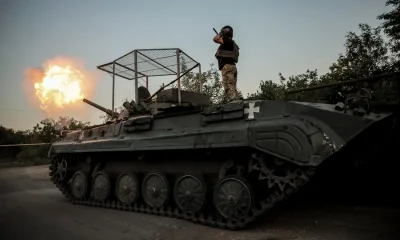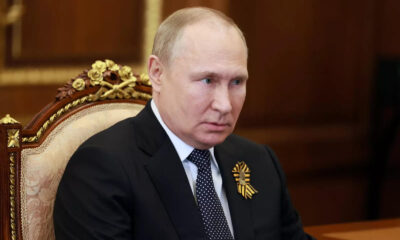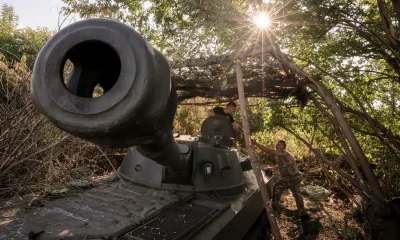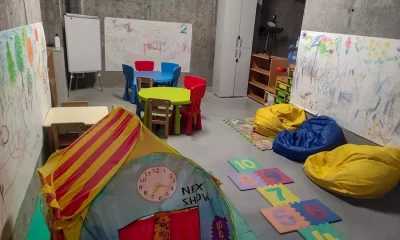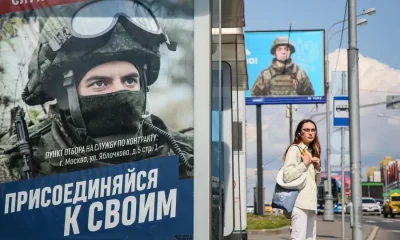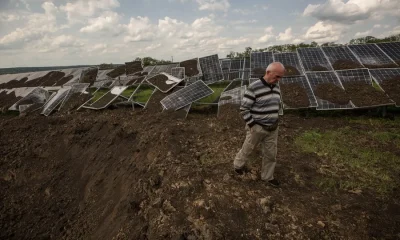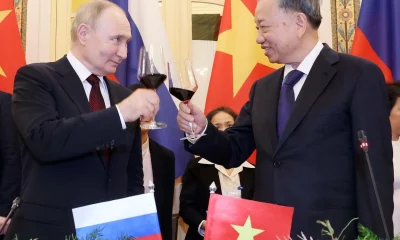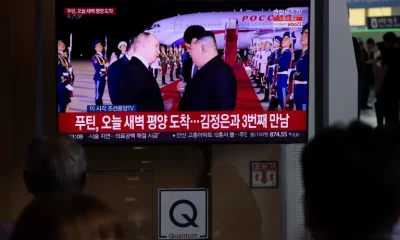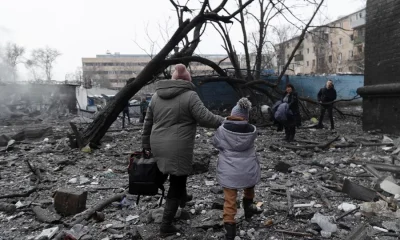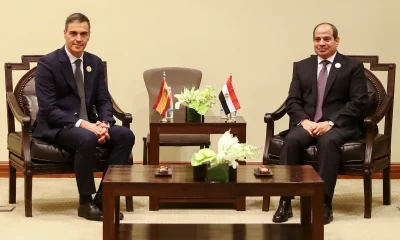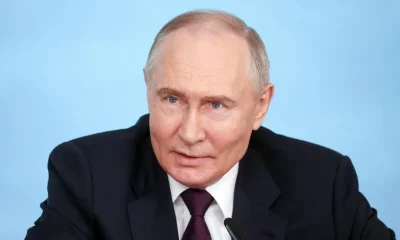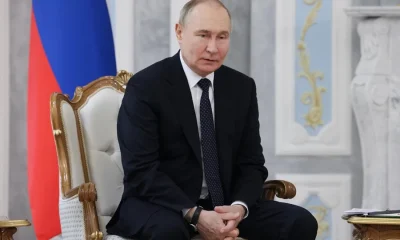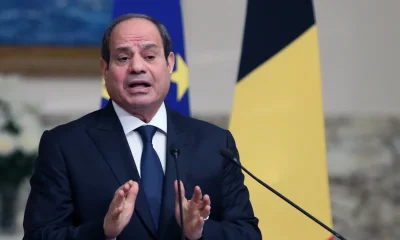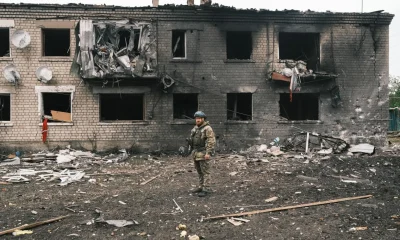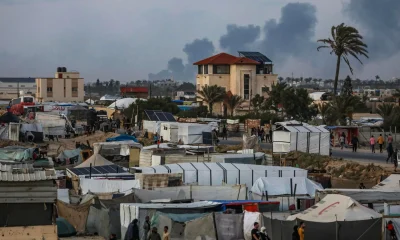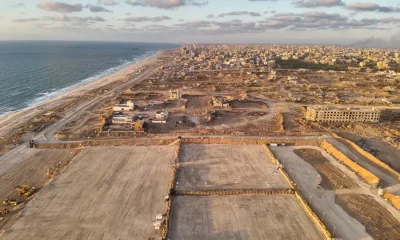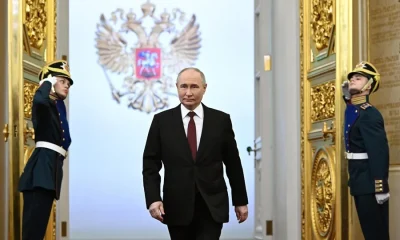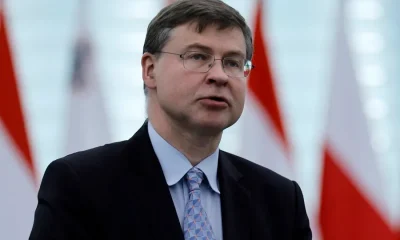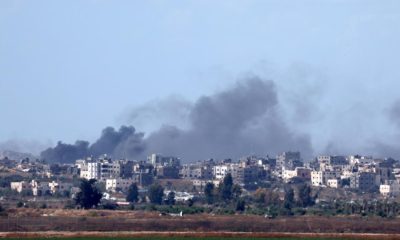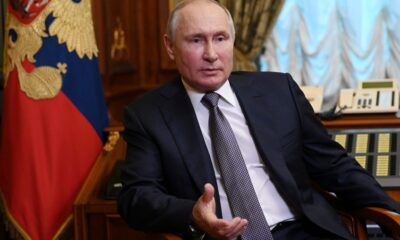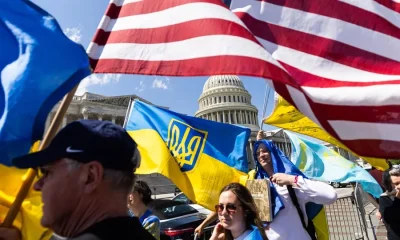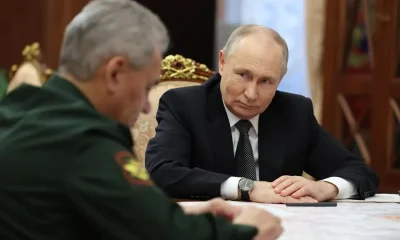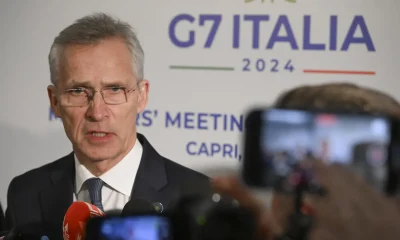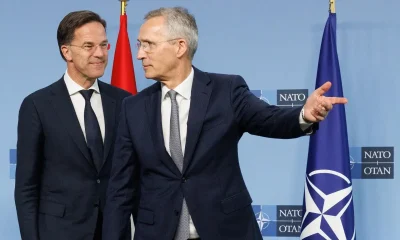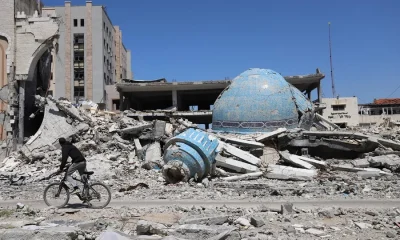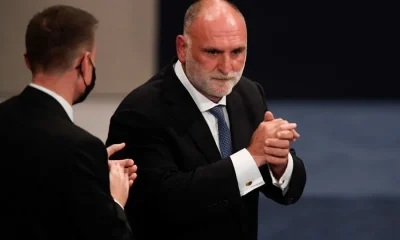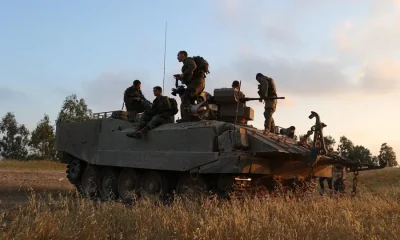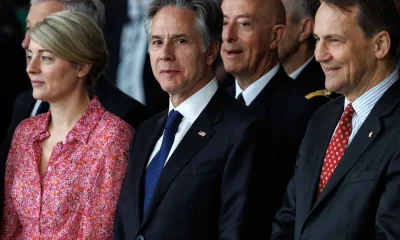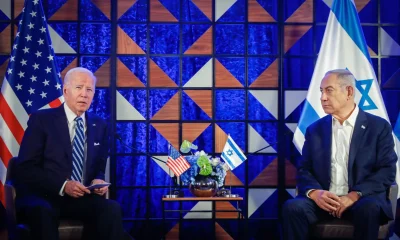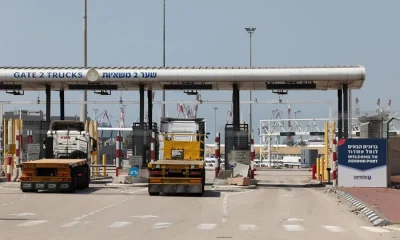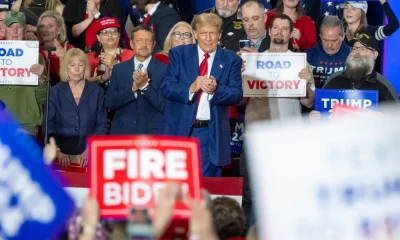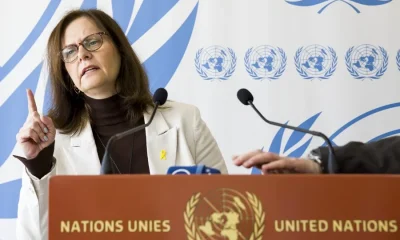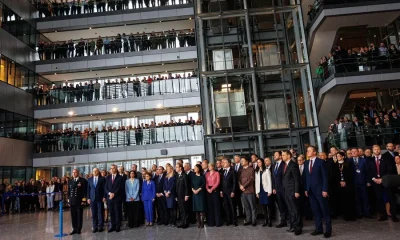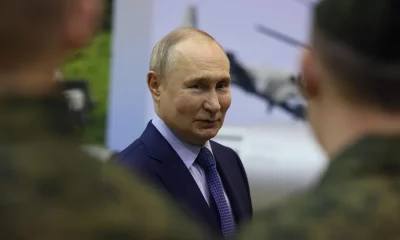International
How to end the wars in Ukraine and Gaza and 4 other global issues in which Xi and Putin coincide
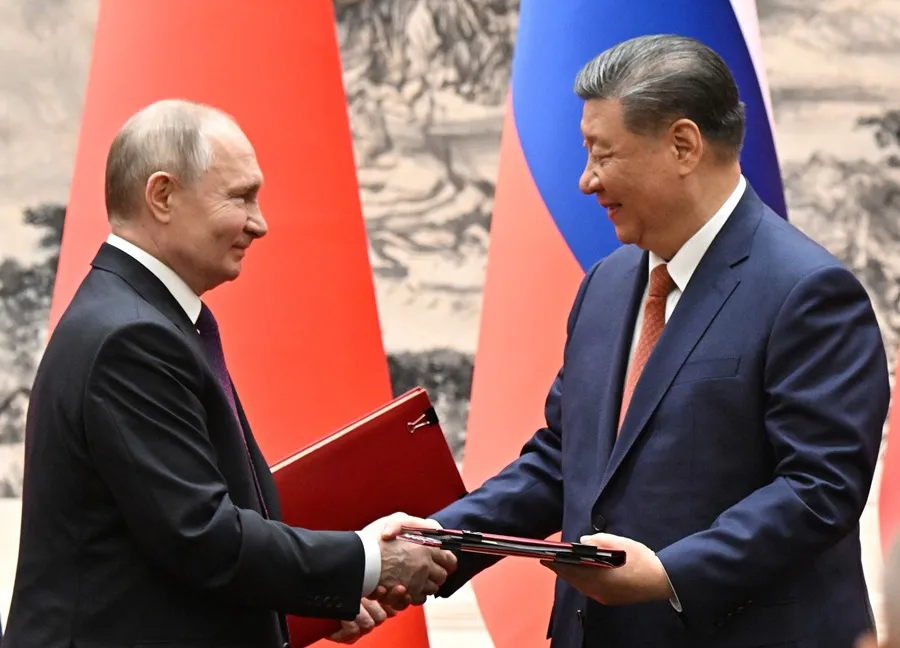
The leaders of China and Russia, Xi Jinping and Vladimir Putin, exhibited this Thursday in Beijing their consensus on global issues such as the conflicts in Ukraine and Gaza, multipolarity and trade, distancing themselves from Western positions.
Putin’s second visit to China in less than a year (and his first trip abroad after starting his fifth term) comes after last week Xi traveled for the first time in five to Europe, where the Chinese leader received new pressure to convince his Russian counterpart to stop his aggression against Ukraine.
In a statement after the meeting they held in Beijing, Xi assured that both parties “agree that a political solution to the ‘crisis’ in Ukraine is the right direction.”
Likewise, he reiterated point by point the position that Beijing has maintained in recent years, asking for “respect for the territorial integrity of all countries,” but also for the “legitimate security concerns of all parties,” in reference to Russia.
Xi’s words on the subject do not suggest that the Chinese leader could have pressured his counterpart to end the war during a meeting that occurred a day after Washington announced in Kiev an additional item of 2 billion dollars (about 1,837 million euros) to help Ukraine acquire weapons from the United States.
Xi declared that both parties consider it “extremely urgent” to find a way out of the situation in Palestine and that they support the “two-state solution” and the implementation of United Nations resolutions on this conflict.
Thus, the two heads of state have staged the coordination of their countries on this issue in scenarios such as the United Nations Security Council, where their representatives have voted similarly on the resolutions in this regard.
The Chinese leader boasted of the “strength” of the ties between Beijing and Moscow, which “have stood the test of the changing international panorama” and that will continue to consolidate to “defend justice in the world.”
The Chinese president recalled that he has met “more than forty times” with Putin, who defined relations between China and Russia as an “example of how links should be built between neighboring states.”
Both parties agreed to “promote multipolarity and globalization” and coordinate in institutions such as the United Nations or the G20 to “lead global management in the right direction.”
In February 2022, shortly before the start of the war in Ukraine, Xi and Putin proclaimed in Beijing a “friendship without limits” and, since then, they have defended that their relationship “advances the multipolarization of the world,” as opposed to American “hegemonism.”
Putin welcomed the expansion of bilateral trade, which “is reliably protected against the negative influence of third countries,” he said in reference to the Western sanctions against his country, criticized in recent years by Beijing for “not solving the problems.”
The Russian president also stressed that energy cooperation between Beijing and Moscow was addressed “in depth” during the meeting, a possible reference to the Power of Siberia 2 gas pipeline, designed to connect Russia and China through Mongolia and that, if completed, would divert 50 billion cubic meters of natural gas per year to northern China.
After surpassing Saudi Arabia, Russia has been China’s main source of oil since 2023, a trade that constitutes an important source of income for the Eurasian country, whose energy exports have been affected by Western sanctions.
In the midst of the American and European offensive against the Chinese automotive sector, Putin defended bilateral collaboration in this field and congratulated China on “a clear and very obvious success” in the sector.
The words of admiration of the Russian leader contrasted with the statements of US President Joe Biden, who recently accused Beijing of “cheating” in that industry and with the EU’s position, which announced a few months ago an investigation of the electric vehicle sector of the Asian giant for possible “illegal subsidies.”
International
Football Fan Killed in Clashes After Colombian League Match

Fans of Cúcuta Deportivo and their traditional rivals Atlético Bucaramanga clashed outside the stadium following their local league match on Tuesday, leaving one supporter dead and several others injured.
The deceased fan was stabbed, according to a senior police official in Cúcuta who confirmed the cause of death in a video statement. Local media reported that the victim was a supporter of the visiting team, Atlético Bucaramanga.
The match ended in a 2-2 draw. Authorities had banned the entry of Atlético Bucaramanga’s organized supporters into the stadium in an effort to prevent disturbances.
Despite the restrictions, violence broke out in the surrounding areas after the game. Among the injured were three police officers, an institutional source told AFP.
The incident adds to a series of recent violent episodes linked to Colombian football. The most recent occurred in December, when supporters of Atlético Nacional and Independiente Medellín clashed in the stands and on the pitch, leaving 59 people injured.
International
Missing Spanish Sailor Rescued After 11 Days Adrift in Mediterranean

The man had departed from the port of Gandía, on Spain’s eastern coast, with the intention of reaching the southern Spanish town of Guardamar del Segura, a journey of about 150 kilometers, a spokesperson for Spain’s maritime rescue service told AFP.
Search boats and aircraft were deployed on January 17, but the operation was called off on January 22 after efforts proved unsuccessful. Alerts were then issued to vessels navigating the area in case they spotted any signs of the missing sailor.
As hopes were fading, a surveillance aircraft from the European Union’s border agency Frontex spotted the sailboat on Tuesday, along with a person signaling for help, approximately 53 nautical miles northeast of Bejaia, Algeria.
A nearby vessel, the Singapore-flagged bulk carrier Thor Confidence, carried out the rescue and is expected to bring the man to an end to his ordeal when it arrives on Thursday in the southern Spanish port city of Algeciras.
Maritime rescue services shared images on social media showing a small white sailboat drifting at sea and secured alongside the much larger ship.
It remains unclear how the sailboat ended up hundreds of kilometers off its intended route or how the man managed to survive for so long alone in open waters.
International
Rubio Says U.S. Could Participate in Follow-Up Russia-Ukraine Talks

The United States could join a new round of talks this week aimed at ending Russia’s invasion of Ukraine, Secretary of State Marco Rubio said on Tuesday.
Teams from Kyiv and Moscow met last Friday and Saturday in Abu Dhabi in their first publicly acknowledged direct negotiations to discuss the peace initiative promoted by former U.S. President Donald Trump.
“They are going to hold follow-up talks again this week,” Rubio told the Senate Foreign Relations Committee. “There could be U.S. participation.”
However, Rubio suggested that Washington’s role may be more limited than during last week’s discussions, which included Steve Witkoff, the president’s special envoy, and Jared Kushner, Trump’s son-in-law.
The secretary of state indicated that progress may have already been made on security guarantees for Ukraine, one of Kyiv’s key demands in any agreement with Moscow after nearly four years of Russian invasion.
“There is one remaining issue that everyone is familiar with, and that is the territorial claim over Donetsk,” Rubio said, referring to the eastern Ukrainian region that Russia wants Ukraine to cede.
“I know that active efforts are underway to see whether the positions of both sides on this issue can be reconciled. It remains a bridge we have not yet crossed,” he added during the hearing.
Rubio acknowledged that the territorial question would be particularly difficult for Ukraine to resolve.
-

 Central America3 days ago
Central America3 days agoGuatemala seizes over a ton of cocaine hidden in flour at Pacific port
-

 International5 days ago
International5 days agoTrump-Era Defense Plan Prioritizes Border Security and Scales Back Global Commitments
-

 International5 days ago
International5 days agoBogotá and Quito Seek Dialogue After Tariffs and Power Cut Escalate Tensions
-

 International4 days ago
International4 days agoDelcy Rodríguez seeks political agreements after Maduro’s ouster
-

 International3 days ago
International3 days agoHistoric snowstorm paralyzes Toronto after 60 centimeters of snow
-

 International3 days ago
International3 days agoSpain’s irregular migrant population rises to 840,000, study finds
-

 International4 days ago
International4 days agoFederal immigration agents kill man in Minneapolis, sparking protests and outrage
-

 Central America1 day ago
Central America1 day agoGuatemala Police Arrest Prison Guard Caught in the Act of Extortion
-

 Central America1 day ago
Central America1 day agoHonduras swears in conservative president Asfura after disputed election
-

 Central America1 day ago
Central America1 day agoBukele leads public trust rankings as UCA survey highlights gains in security
-

 Sin categoría1 day ago
Sin categoría1 day agoEight Killed in Series of Armed Attacks in Ecuador’s Manabí Province
-

 International3 days ago
International3 days agoRights group says nearly 6,000 killed in Iran protest crackdown
-

 International1 day ago
International1 day agoDoomsday clock moves to 85 seconds before midnight amid rising global risks
-

 International1 day ago
International1 day agoWinter Storm Fern Leaves 30 Dead and Over One Million Without Power Across the U.S.
-

 International3 days ago
International3 days agoVenezuela frees at least 80 political prisoners, NGO says
-

 International1 day ago
International1 day agoSpain approves plan to regularize up to 500,000 migrants in Historic Shift
-

 Sin categoría1 day ago
Sin categoría1 day agoEl Salvador Launches Fourth Year of Ocean Mission to Protect Marine Ecosystems
-

 International9 hours ago
International9 hours agoFootball Fan Killed in Clashes After Colombian League Match
-

 International9 hours ago
International9 hours agoRubio Says U.S. Could Participate in Follow-Up Russia-Ukraine Talks
-

 International3 days ago
International3 days agoEU launches new probe into X over AI-generated fake nude images
-

 International9 hours ago
International9 hours agoMissing Spanish Sailor Rescued After 11 Days Adrift in Mediterranean
-

 Central America9 hours ago
Central America9 hours agoGuatemala President Says Starlink Terminal Found Inside Prison
-

 International3 days ago
International3 days agoSevere winter storm grips U.S., leaves multiple dead as extreme cold persists
-

 International3 days ago
International3 days agoFrance debates ban on social media for children under 15

























